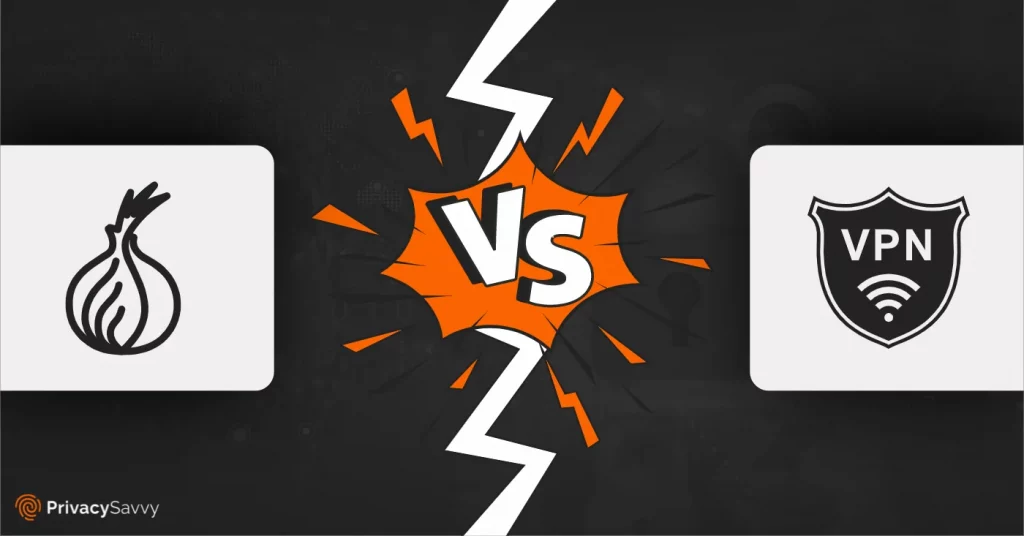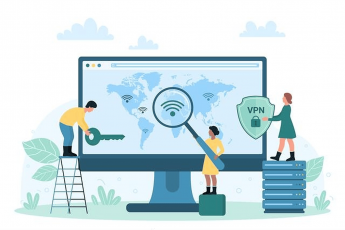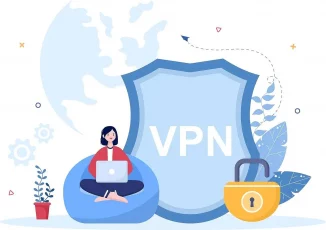Virtual Private Networks (VPNs) and the Tor network are two very different technologies created to fulfill the same purpose: keeping a user’s online privacy safe. However, their characteristics make their use cases different, even if they supposedly perform the same essential task.
Of course, VPNs and Tor also have a few things in common. For example, both redirect internet traffic through proxies. This masks a user’s actual IP address (and hence, their location) from any third parties, thus preventing external tracking. Likewise, encryption is also a common feature. It scrambles every piece of data coming in and out of a user’s device so that any external observer sees nothing but white noise and cannot figure out what the user is doing online.
These two features (IP hiding and encryption) are the most basic functions that every VPN must perform. While any other feature is a plus, you can’t call it a VPN if it fails at these two. Yet, Tor performs these two functionalities equally well.
So what is the difference? Which one should you use? This guide answers this question by comparing VPN vs Tor in detail.
Related read: What is Onion over VPN
Tor: When and why use it?
The following tasks are better done when using Tor than a VPN:
- Anonymous web access: A Tor connection is practically impossible to trace back to its originating user. Therefore, when you connect to any website through Tor, no evidence of your visit will remain behind, neither in the server you visited nor on your device. It will be like you never did it.
- Finding the dark web: The dark web or darknet is a subset of the internet composed of websites you can only access through Tor or Freenet and that are not indexed or available through Google’s links and searches. The reputation of the darknet websites is terrible, often associated with digital criminal activities such as illegal black markets. However, there are good reasons to use it too. Wealth is one. Another one is the protection of online anonymity and privacy.
- For untraceable communication: There are a few situations in which standard private communication methods do not suffice. For instance, investigative journalists talking to their sources, whistleblowers, dissidents, and activists need to use Tor to communicate without leaving any evidence trail behind, which is a necessity when your foes are mighty, ruthless, and dominate the standard internet communication channels.
Tor won’t allow you to choose the location for the web to see as yours – at least, not by default. Additionally, it’s not hard for a website to tell if an incoming connection comes from the Tor network so that it can block it.
Tor is a thoroughly secure protocol indeed. But every connection has to go through Tor’s entrance and exit relays. Moreover, those nodes in the network are public (and rather known if not famous). So, any external observer interested in your online activities can know that you’re using Tor.
Of course, once your traffic is bouncing within the Tor network, those same observers (which could include your ISP) won’t be able to figure out what you’re doing exactly. But they will know for sure that you’re on Tor and that in itself could raise suspicions.
The Tor network, in itself, is merely a neutral technical resource. But do not forget that Tor use is often associated with criminal activities. Of course, you can avoid these pitfalls with Tor bridges, but that’s a bit complicated.
VPN: When and why use it?
VPNs are better than Tor if you intend to perform the following tasks:
- Unblocking region-locked content: Many video streaming sites will let you see a portion of their catalog, depending on the country from which your connection is coming. VPNs will give you an IP address from one of their servers that will make it look as if you’re a resident elsewhere in the world. Additionally, while not all VPNs in the market offer high connection speeds, plenty of them do. Many are fast enough to support an HD video stream, something you will never find in Tor because Tor’s connections are very safe but also painfully slow, utterly useless for multimedia applications.
- BitTorrent: These days, even the Piratebay and its alternatives urge you for torrenting through a VPN – not Tor. Because of Tor’s inherent slow speeds and tunnels usually limited to web traffic, even if you manage to channel your torrenting traffic through a Tor relay, speeds will be sluggish.
- When using public WiFi hotspots: Do you love free public WiFi hotspots, like the one at your nearest Starbucks? Well, hackers love them as much as you! It’s because of all that unencrypted information floating around on the air, giving access to so much cool stuff from the unsuspecting users! Indeed, hackers know their trade and where to find new victims, and public WiFi hotspots are among their favorite spots. However, if you’re traveling for any reason, you’ll need to use a public WiFi service sooner or later. And when you do, your only chance to remain safe against digital snoopers is to have a VPN service available. A VPN’s encrypted traffic will prevent any third party from tracking or collecting your browsing activities. Consequently, your browsing experience won’t suffer regarding speed in any noticeable way.
- Circumventing censorship: Some countries employ heavy internet censorship. China is the most notorious example, followed by Russia, Vietnam, and more. Since a VPN makes you look like you were somewhere else, your local censorship won’t affect what you can access on the internet.
- Preclude ISP throttling: Some providers will curtail your bandwidth upon noticing intensive activities, such as streaming and torrenting. However, if your ISP can’t tell precisely what you’re doing with your connection, it won’t be able to throttle it. That’s where a VPN’s encryption helps you by hiding your activities.
But are VPNs the magic bullet compared with Tor? Not really. Your VPN provider still knows everything you do online because all your traffic goes through its servers. So the question is: can you trust your VPN provider will all that information?
This issue is irrelevant within the Tor network because the system is trustless (keep on reading for that). But when it comes to your VPN, you will need to trust that your VPN does not keep logs on you. The best VPNs in the industry protect your privacy and anonymity by adhering to a strict zero-log VPN policy. But trust is still the heart of the matter.
Another thing that a VPN won’t do is take you into the dark web. That’s because the .onion sites constituting this network need Tor. Some VPNs, however, will allow you to run a Tor session over the VPN network. But that’s still because of Tor and not the VPN network.
Tor vs. VPN: What is the key difference?

A VPN can have many features today, but only two are essential for the service to be considered a VPN: encrypting all your incoming and outgoing traffic and assigning you a new IP address from the VPN network. Interestingly, Tor also serves both of these purposes. So how do these two differ?
Comparing VPN vs Tor reveals that the differences don’t exist in what they do, instead of in how they do it. Here are the key factors differentiating Tor and VPN services.
Centralization
A VPN is centralized, unlike Tor.
Centralization means that a central authority controls all the traffic at all times. In this case, your VPN provider is the authority, usually a private corporation. The company owns (or rents) and operates hundreds or thousands of servers scattered globally.
As a user, you connect to one of those servers in the network to join the VPN and have your traffic protected. Thus, the VPN model can give its users a good level of privacy and high-speed connections.
These advantages, however, come at a price. Specifically, you need to trust your VPN provider’s behavior and policies to protect you. That’s because privacy is not hardwired into the process; it must be implemented through zero-log keeping and other measures.
On the other hand, Tor is decentralized. Nobody owns and manages Tor in its entirety. Instead, the nodes in the network acting as relays are owned and operated by volunteers worldwide. When you connect to Tor, your data is routed through a random path using different relays in the network each time you visit a website. So it’s possible to read the data at the final point of the way, known as the exit relay. But there’s no way to know where it came from initially.
Use case specificity
The second difference between the two is about your priorities when using them.
Both technologies secure your online privacy and anonymity. But each puts its focus on one aspect at a time. Thus, VPNs are built to protect your privacy, while Tor is made to protect your anonymity.
Now, what is the difference between privacy and anonymity? Don’t you have one if you have the other, we hear you ask.
Well, the answer is, these two aren’t the same.
In simple words, anonymity hides who you are, whereas privacy hides what you do online. So, one is about protecting your identity, while the other one, about protecting your activities.
That’s how the two tools, VPN and Tor, differ from each other. VPN is a tool for activities where you need privacy, whereas Tor promotes activities requiring anonymity, such as whistleblowing, sharing news, etc.
Tech mechanics
When you compare VPN vs Tor, you’ll notice that the basic mechanics in each technology are also similar but not quite the same.
For example, a VPN encrypts all your traffic, then sends it to the internet through a node in the network – the VPN server. The same server also shows the world an IP address in the network as yours.
In contrast, Tor will also encrypt your data, but it’s not as centralized. Instead, it sends your encrypted traffic through a random sequence of servers in its network, which volunteers maintain.
These mechanics in each tool also make it suited for a set of tasks.
Key benefits of using VPNs and Tor
Given that both technologies have different purposes, mechanics, and functionality, you can’t compare VPN vs Tor to know which one has more benefits. Both the tools have various benefits depending on why and how you use them.
Advantages of VPN
- Hide your location online. A VPN masks your real IP address and location with the one from the server you choose. That’s how your actual coordinates remain hidden.
- Access content from other regions. Most VPNs offer multiple server locations to choose from. Hence, you can easily access content from any desired region as far as your VPN provider offers a server from that region.
- Bypass content blocking. As you change your online location by connecting to a virtual network, you no more remain bound to the local content restrictions. Hence, you can access all those sites that you could previously can’t use.
- Ensure online security on public WiFi. As the VPN encrypts your internet traffic, it protects you from any network snoopers, even if you use public WiFi.
- Easily install on any device. Most VPN services support multiple devices. So, you can easily install them on any device you want.
Advantages of Tor
- Inclusive anonymity. You can trust the level of anonymity Tor gives you considering the fact that most power users dealing with sensitive stuff, such as journalists, activists, whistleblowers (and also, cybercriminals – though we don’t encourage such malicious uses), use Tor for confidential exchange of information.
- Identity protection. When using Tor, no one can see your real IP address and/or your device data, thereby becoming unable to identify you online. Of course, this doesn’t include situations where you intentionally share your information with the other parties. But what tor ensures is preventing data snooping. Thus, all others online will have to trust the details you share intentionally – they can’t spy on you.
- Multi-layer traffic encryption. Tor redirects your traffic through multiple nodes before forwarding it to the internet. During this process, it encrypts your data multiple times, hence ensuring total anonymity.
- Prevent spying. The robust technology and encryption behind the Tor network ensure no one can spy on you online.
- Unrestricted access to the internet. Since your real IP address and location remain hidden online, you can easily access geo-restricted content on your device.
Tor onion routing and single hop VPN routing
In most VPNs, you’ll use a single VPN server. The process starts in your own device, where your outgoing data gets encrypted, then sent to the VPN server. Finally, the server decrypts it and sends it to its final destination on the internet.
A handful of VPN providers offer the possibility of multi-hop connections in which two or more servers participate in the process, each adding a new level of encryption. But these are not the industry standard, and they’re costly in terms of speeds and performance.
Yes, the multi-hop setup certainly adds to a connection’s privacy, but it’s overkill as a single server’s encryption is enough for all types of users.
Tor stands for “the onion router.” The name comes from the onion routing process characteristic of this protocol.
Here’s how it works: when your data reaches Tor, the network sends it through three random relays at least. Each relay encrypts your data once and includes the IP address of the next relay in the chain.
Then, the next relay removes the previous encryption layer, revealing the next relay in the chain while it hides it from the previous one and adds an encryption layer of its own. In this way, no relay in the process can know the whole story about your data. That makes tracing exceedingly difficult to achieve in onion routing.
The Tor browser vs. VPN apps
You can set up various devices and applications to take advantage of Tor. However, the most common Tor implementation is the Tor browser. That’s what most users mean by “Tor,” and versions that support other apps or devices are on the rare side of things.
The Tor Browser, Tor’s primary implementation and tool, is essentially a fork of Mozilla Firefox with Tor’s navigation specifications built-in to ensure security and anonymity.
On the surface, the Tor Browser appears the same as Firefox, but it tunnels all the web traffic it creates through the Tor network. It doesn’t store cookies or web histories or run scripts, so privacy is the top priority.
Tor is available in other implementations as well. For instance, TAILS — a whole operating system tailored for Tor. But then, you also have SecureDrop and Ricochet Refresh, which are communication apps.
VPNs are different in that they usually protect all the traffic originating in a device, not just the browsing data. Connecting to a VPN means connecting to a server in the network, and you achieve that in several ways.
You can use a VPN app or a built-in client on any device of your choice. Sometimes, the most versatile VPNs allow you to configure your home WiFi router. Then all the traffic passing through the router goes through the VPN without separately installing any apps on your respective devices.
Most commercial VPN providers save you some time and effort by providing their own apps. These apps come preconfigured and include the network’s server list.
The best VPN apps in the market will enhance your security significantly. They will protect your data against IP leaks; they will include kill switch, traffic obfuscations, split tunneling, and many other features.
You don’t even need the apps to make the VPN work. The most used operating systems include support for VPN servers in a rudimentary way. Then, of course, you need some expertise to configure the individual VPN server you want to use. But the logic infrastructure is there in Android, iOS, Windows, macOS, and Linux for you to use if you so choose.
VPNs and Tor: Can I use them concurrently?
Yes.
You can indeed use Tor and VPNs at the same time. There’s nothing to prevent you from doing that. But your internet speeds could suffer from it.
So how do you do this? The most straightforward way is to launch your Tor browser while your system is within your VPN network. In this way, the Tor network will do its homework through the VPN servers.
The advantage of this approach is that if your ISP is unfriendly towards Tor connections, your VPN will hide them from it.
So which option should I be using, Tor or VPN?
Comparing VPN vs Tor explains that the two are different tools designed to perform various tasks. Thus, which one you use depends on what you want to do. However, they are not in direct competition because they’re not equivalent while their tasks seem similar.
So here’s a good rule to keep in mind. First, have your VPN active and use it all the time on all your devices, especially if you’re on public WiFi hotspots. Then, launch your Tor browser and use it when you need it only – for example if you need to browse around the dark web.
Paid services vs. free ones
The Tor network is free. All you need to use it is to download and install the Tor browser, and that’s it. No need for subscription fees or accounts of any kind. It’s free because Tor runs on a network maintained by volunteers and privacy enthusiasts.
VPNs are another thing entirely. Free VPNs are out there on the internet – but you should never use them.
There are many reasons for users to adopt a VPN service. Of course, privacy and anonymity are usually the top reason to join, but VPNs have other uses (unblocking content, bypassing censorship, and other use cases) besides privacy, strictly speaking.
Consequently, different VPN networks are focused on various aspects of the service. Some put privacy at the top of the list, but speeds suffer. Others will focus on keeping your privacy secured but emphasize speed connections so that you can use the network for video streaming.
Free VPNs will do the two things you expect the most from a VPN: encryption and IP masking. But most will cap your data usage and not provide you with speeds that support multimedia streams. So even if you could get a stream going, the data cap will prevent you from watching more than a few minutes of content.
But the lack of speed is not the only reason to avoid Free VPNs.
Here’s a bit of digital economics you should always keep in mind: if in any context you’re not being charged for the use of a product of any kind, then you are the project on offer. Of course, this applies to free VPNs as well.
Running a VPN network is an expensive proposition. First, you need to have at least tens of servers available all around the globe — though some VPNs boast thousands of nodes in their network.
In addition, each server needs administration, electricity, maintenance, etc., alongside the providers paying bills and meeting ends meet. So how does an organization that doesn’t charge you for its service get the money to keep online? That is where it all gets tricky.
We’ve mentioned how, in VPNs, there is always an element of trust involved with the provider you choose. And that’s the problem. The business model in most free VPNs involves logging your activities within the VPN, then selling them to their commercial partners.
That’s how they pay their bills. So most free VPNs will keep you safe from real-time third parties and external observers. But, your data eventually ends up scrutinized by a corporation that knows how to monetize it. So you can’t trust free VPNs to protect your privacy because you and your activities are the product of this transaction.
So you should always stay away from free VPNs. It’s not only that they’re limited in resources, data, or bandwidth. But, more importantly, using this service beats the purpose of a VPN. So even if it charges you no fee at all, it ends up being too expensive anyway.
Consider this: an excellent VPN membership, such as NordVPN, will set you back by about 10 USD monthly. That’s not much money by any meaningful standard, and the rewards in terms of safety are enormous.
Just think about being able to be online at your favorite Starbucks WiFi hotspot without running any risk of getting hacked. The chances are that you will be spending more money on the coffee and cookies you’ll have there than on your monthly VPN fee.
Final thoughts: Which one among Tor and VPN is better?
If you want your privacy protected, both Tor and VPNs will do the trick for you. But what is the best choice?
You should probably try not to think about this issue in terms of “best” or “worse.” Both technologies are tools designed for different tasks, so each is best at its own job.
VPNs come in a variety of shapes and sizes, but good ones are fast, encrypt everything you do or see, put you in control of your public location, and can get you access to any website in the world.
So while both tech platforms are inherently different, there’s no doubt that VPNs are the more powerful option.
Of course, if privacy is important to you, you need to make sure that your VPN provider keeps no logs at all. If you’re going to trust a service, choose one worth it. A couple of VPNs that we can recommend here are ExpressVPN and NordVPN.
Above all, stay safe!
FAQs
It depends on your VPN for a start. It depends even more on the online activity you intend to perform. Tor browsing is perfect for bypassing censorship, ensuring anonymity, and enhancing privacy. But browsing on Tor is very slow, so its helpfulness is very limited if you have multimedia on your mind.
Yes, it is. If you don’t have a VPN service, the Tor browser will keep you safe.
It depends on your jurisdiction. Some authoritarian governments like Iran or China have made Tor illegal indeed. In the rest of the world, Tor is not forbidden in any way. But it’s somewhat frowned upon because it’s related to the dark web, which has a notoriously bad reputation.
It depends. Free VPNs can increase your security risks instead of lowering them for the reasons explained above. However, the best providers in the VPN industry are very safe at all times.
You can use both tools simultaneously, but it’s beside the point. First of all, you don’t need the additional security you’ll have in that scenario. Secondly, your Tor browsing will be so slow that you will soon wish you didn’t.






